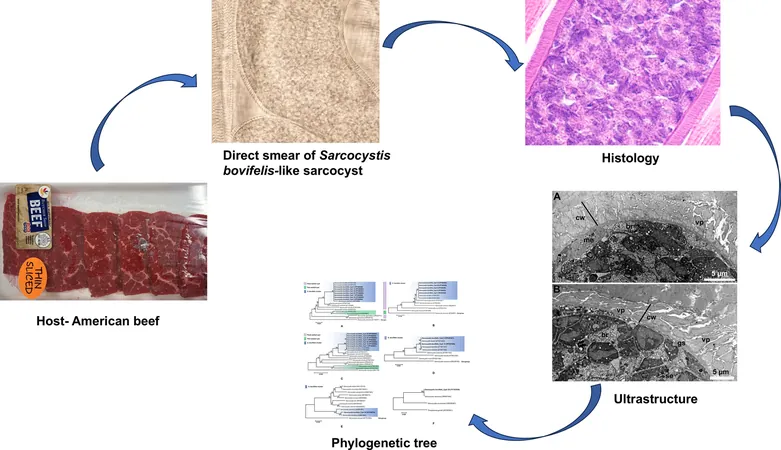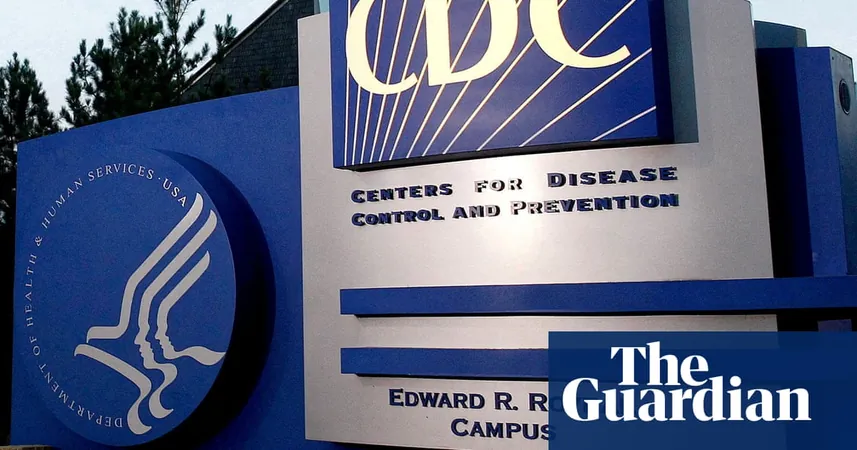
Unveiling a New Sarcocystis Threat: Characterization of a Mysterious Parasite in American Beef!
2024-12-28
Author: Sarah
Introduction
In a groundbreaking study, researchers have identified a previously uncharacterized thick-walled parasite, linked to the Sarcocystis genus, in beef sourced from a grocery store in Maryland. With the potential to impact public health and the meat industry, this discovery sheds light on the hidden dangers lurking in our food supply.
Background
Worldwide, the Sarcocystis genus comprises various parasites capable of infecting cattle, which are critical for the global meat supply. Among them, Sarcocystis cruzi and Sarcocystis heydorni have been frequently studied due to their thin-walled cysts. However, nearly half a dozen other species, including Sarcocystis bovifelis, possess thick cyst walls and can provoke severe inflammation in the host's muscles, leading to meat condemnation during inspections. In particular, S. bovifelis is known to be transmitted by cats, raising concerns regarding zoonotic transmission to humans.
This study holds significant importance as S. bovifelis and its relatives' prevalence is poorly documented in the United States, unlike in Europe where these parasites contribute to a considerable health burden.
Methodology
The researchers examined a 500g package of top round beef purchased in July 2023 through various methods including acid-pepsin digestion, microscopic analysis, histology, and advanced transmission electron microscopy (TEM). They also employed molecular techniques to amplify and sequence DNA markers for a comprehensive characterization.
Key Findings
The results revealed a startling 100% genetic identity with S. bovifelis-like sarcocysts found in naturally infected cattle from countries like Germany and Argentina. Morphological evaluations highlighted notable differences compared to previous S. bovifelis descriptions, indicating potential variations in structural characteristics that warrant further investigation.
Why This Matters
The implications of this discovery are vast. Sarcocystis infections not only compromise livestock health but also threaten human safety. As zoonotic diseases become increasingly concerning in today's interconnected world, understanding and documenting these parasites are crucial for effective public health responses and regulations surrounding the meat industry.
Sarcocystis penalties can include health ramifications for consumers and economic losses for producers due to carcass rejections. The study underscores the urgent need for improved diagnostic techniques and surveillance of beef products.
What’s Next?
With these genetic markers now identified, researchers plan to further characterize this novel species through enhanced ultrastructural studies. Understanding its prevalence could help in establishing safety standards for our food supply, potentially impacting regulations in the beef industry.
This study not only reveals a hidden danger in American beef but also opens doors to better meat safety measures that can protect consumers nationwide. As the investigation unfolds, the findings could lead to new protocols aimed at combating Sarcocystis parasites, ensuring that beef remains safe for consumption.
Conclusion
This research marks a significant advancement in the understanding of Sarcocystis species within the American beef supply and emphasizes the importance of ongoing parasite surveillance. As the conversation around food safety intensifies, the implications from this study will resonate far beyond the lab, touching on health regulations, public policy, and consumer awareness.
Stay tuned for more updates as we unravel the complex world of beef safety and parasite control!


 Brasil (PT)
Brasil (PT)
 Canada (EN)
Canada (EN)
 Chile (ES)
Chile (ES)
 Česko (CS)
Česko (CS)
 대한민국 (KO)
대한민국 (KO)
 España (ES)
España (ES)
 France (FR)
France (FR)
 Hong Kong (EN)
Hong Kong (EN)
 Italia (IT)
Italia (IT)
 日本 (JA)
日本 (JA)
 Magyarország (HU)
Magyarország (HU)
 Norge (NO)
Norge (NO)
 Polska (PL)
Polska (PL)
 Schweiz (DE)
Schweiz (DE)
 Singapore (EN)
Singapore (EN)
 Sverige (SV)
Sverige (SV)
 Suomi (FI)
Suomi (FI)
 Türkiye (TR)
Türkiye (TR)
 الإمارات العربية المتحدة (AR)
الإمارات العربية المتحدة (AR)